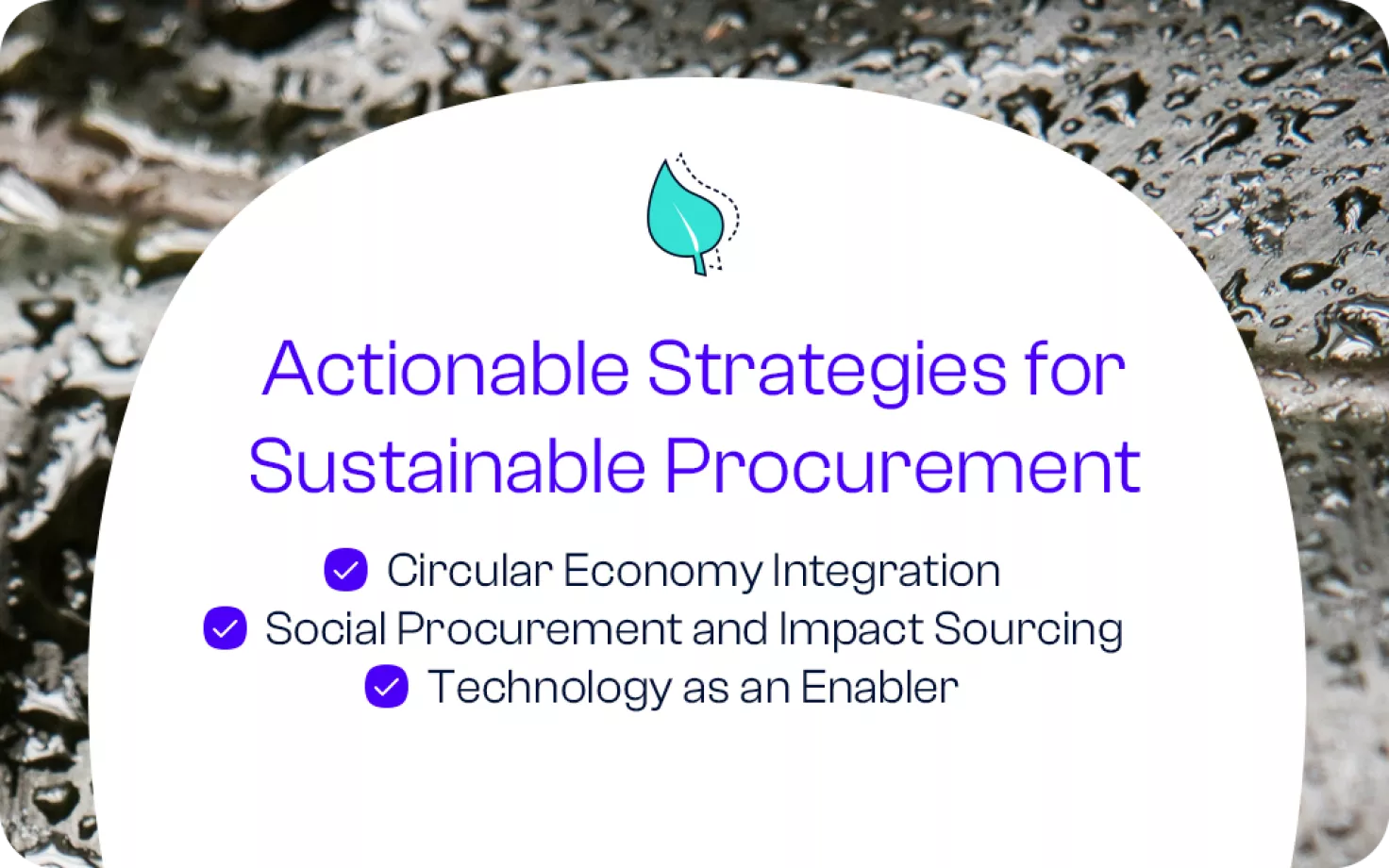Insight
Why sustainability is a priority for procurement leaders
The importance of sustainability within procurement is no longer a topic of debate.

Integrating ESG into Core Procurement Processes
The focus has shifted from ”why” to ”how,” as leading organizations recognize the need to move beyond simply acknowledging sustainability and actively integrate Environmental, Social, and Governance (ESG) factors into their core procurement processes. This transition signifies a move from reactive, ad-hoc sustainability efforts to a proactive, strategic approach where ESG becomes embedded in the DNA of procurement operations.
The Evolution of ESG in Procurement
In recent years, global events like the COVID-19 pandemic and geopolitical tensions have exposed the vulnerabilities of traditional supply chain models and emphasized the need for greater resilience and responsibility. As a result, ESG has evolved from a peripheral concern to a central element of procurement strategy. Best-in-class procurement organizations are now weaving ESG considerations into their everyday decision-making, recognizing its impact on risk management, brand reputation, and long-term value creation.

Actionable Strategies for Sustainable Procurement
Moving from a reactive to a proactive ESG approach requires implementing concrete strategies and actionable steps within procurement processes:
- Circular Economy Integration: Procurement plays a pivotal role in transitioning towards a circular economy. This involves prioritizing sustainable materials, such as recycled content and bio-based materials, and designing products for longevity, repairability, and recyclability. Procurement teams can also explore options like take-back programs and closed-loop supply chains to minimize waste and promote resource efficiency. (Consider adding a statistic about the potential impact of circular economy initiatives on resource conservation or waste reduction.)
- Social Procurement and Impact Sourcing: Procurement can drive positive social impact by actively engaging a more diverse supplier base, including minority-owned and women-owned businesses. Supporting local businesses and participating in impact sourcing initiatives that create jobs and economic opportunities in underserved communities are also crucial components of social procurement. (Consider linking to relevant resources or case studies on Beroe's website or external sources.)
- Technology as an Enabler: Technology can significantly enhance and streamline sustainable procurement efforts. AI-powered supplier assessments can provide data-driven insights into ESG performance, while blockchain technology can enhance transparency and traceability within supply chains. Data analytics tools can help track progress towards sustainability goals and identify areas for improvement. (Consider adding specific examples of technology solutions offered by Beroe or other providers.)
Overcoming Challenges and Implementing Solutions
Implementing sustainable procurement practices comes with its own set of challenges. Procurement leaders may face resistance to change, limited access to data, and difficulties in measuring ESG impact. However, solutions exist to overcome these hurdles. Building cross-functional collaboration, investing in training and education, and partnering with external experts like Beroe can provide the necessary support and expertise to successfully integrate ESG into procurement processes.
Metrics, Measurement, and Transparency: Demonstrating Progress
Measuring and tracking ESG performance is crucial for demonstrating progress and ensuring accountability. Procurement teams should establish clear metrics aligned with their sustainability goals, such as carbon footprint reduction, percentage of spend with non-core, more-varied suppliers, and employee health and safety indicators. Transparency is also key, with regular reporting and communication to stakeholders creating trust and demonstrating a genuine commitment to ESG principles.
Procurement: Leading the Charge towards a Sustainable Future
The integration of ESG into core procurement processes represents a significant step towards a more sustainable and responsible business landscape. Procurement leaders have a unique opportunity to drive positive change, not only within their organizations but also across their supply chains and the broader global community. By embracing a proactive approach and implementing the strategies outlined above, procurement can become a leading force in the journey towards a more sustainable future.
Request a demo
Discover how our solutions can benefit you. Partner with us to unlock potential and drive success. Let's work together to achieve outstanding results.
Get in touch
We’re here to assist you! If you have any questions or need support, don’t hesitate to reach out. Contact us today and we’ll respond promptly to help with your needs.